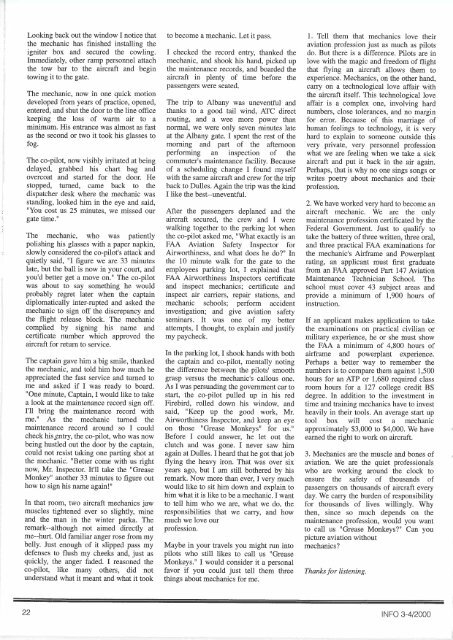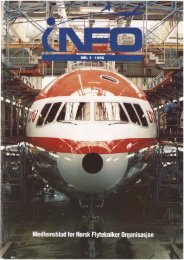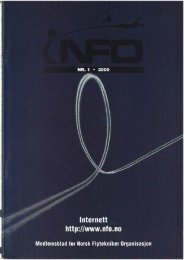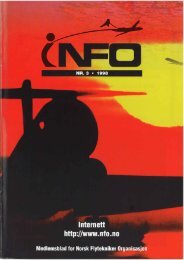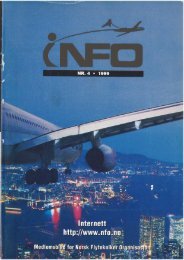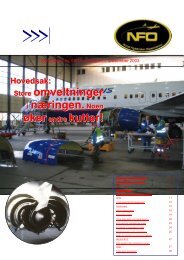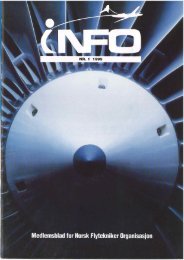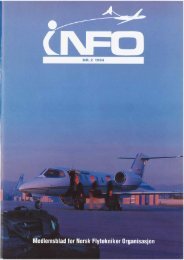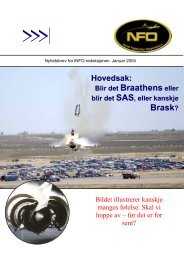Nytt i fra NFO avd. SAS - Norsk Flytekniker Organisasjon
Nytt i fra NFO avd. SAS - Norsk Flytekniker Organisasjon
Nytt i fra NFO avd. SAS - Norsk Flytekniker Organisasjon
You also want an ePaper? Increase the reach of your titles
YUMPU automatically turns print PDFs into web optimized ePapers that Google loves.
Looking back out the window I notice that<br />
the mechanic has finished installing the<br />
igniter box and secured the cowling.<br />
Immediately, other ramp personnel attach<br />
the tow bar to the aircraft and begin<br />
towing it to the gate.<br />
The mechanic, now in one quick motion<br />
developed from years of practice, opened,<br />
entered, and shut the door to the line office<br />
keeping the loss of warm air to a<br />
minimum. His entrance was almost as fast<br />
as the second or two it took his glasses to<br />
fog.<br />
The co-pilot, now visibly irritated at being<br />
delayed, grabbed his chart bag and<br />
overcoat and started for the door. He<br />
stopped, turned, came back to the<br />
dispatcher desk where the mechanic was<br />
standing, looked hirn in the eye and said,<br />
"You cost us 25 minutes, we missed our<br />
gate time."<br />
The mechanic, who was patiently<br />
polishing his glasses with a paper napkin,<br />
slowly considered the co-pilot's attack and<br />
quietly said, "I figure we are 33 minutes<br />
late, but the ball is now in your court, and<br />
you'd better get a move on." The co-pilot<br />
was about to say something he would<br />
probably regret later when the captain<br />
diplomatically inter-rupted and asked the<br />
mechanic to sign off the discrepancy and<br />
the flight release block. The mechanic<br />
complied by signing his name and<br />
certificate number which approved the<br />
aircraft for return to service.<br />
The captain gave hirn a big smile, thanked<br />
the mechanic, and told hirn how much he<br />
appreciated the fast service and turned to<br />
me and asked if I was ready to board.<br />
"One minute, Captain, I would like to take<br />
a look at the maintenance record sign off.<br />
1'11 bring the maintenance record with<br />
me." As the mechanic tumed the<br />
maintenance record around so I could<br />
check his-entry, the co-pilot, who was now<br />
being hustled out the door by the captain,<br />
could not resist taking one parting shot at<br />
the mechanic. "Better come with us right<br />
now, Mr. Inspector. It'll take the "Grease<br />
Monkey" another 33 minutes to figure out<br />
how to sign his name again!"<br />
In that room, two aircraft mechanics jaw<br />
muscles tightened ever so slightly, mine<br />
and the man in the winter parka. The<br />
remark--although not aimed directly at<br />
me--hurt. Old familiar anger rose from my<br />
belly. Just enough of it slipped pass my<br />
defenses to flush my cheeks and, just as<br />
quickly, the anger faded. I reasoned the<br />
co-pilot, like many others, did not<br />
understand what it meant and what it took<br />
to become a mechanic. Let it pass.<br />
I checked the record entsy, thanked the<br />
mechanic, and shook his hand, picked up<br />
the maintenance records, and boarded the<br />
aircraft in plenty of time before the<br />
passengers were seated.<br />
The trip to Albany was uneventful and<br />
thanks to a good tail wind, ATC direct<br />
routing, and a wee more power than<br />
normal, we were only seven minutes late<br />
at the Albany gate. I spent the rest of the<br />
morning and part of the aftemoon<br />
performing an inspection of the<br />
comrnuter's maintenance facility. Because<br />
of a scheduling change I found myself<br />
with the same aircraft and crew for the trip<br />
back to Dulles. Again the trip was the kind<br />
I like the best--uneventful.<br />
After the passengers deplaned and the<br />
aircraft secured, the crew and I were<br />
walking together to the parking lot when<br />
the co-pilot asked me, "What exactly is an<br />
FAA Aviation Safety Inspector for<br />
Airworthiness, and what does he do" In<br />
the 10 minute walk for the gate to the<br />
employees parking lot, I explained that<br />
FAA Aimorthiness Inspectors certificate<br />
and inspect mechanics; certificate and<br />
inspect air carriers, repair stations, and<br />
mechanic schools; perform accident<br />
investigation; and give aviation safety<br />
seminars. It was one of my better<br />
attempts, I thought, to explain and justify<br />
my paycheck.<br />
In the parking lot, I shook hands with both<br />
the captain and co-pilot, mentally noting<br />
the difference between the pilots' smooth<br />
grasp versus the mechanic's callous one.<br />
As I was persuading the government car to<br />
start, the co-pilot pulled up in his red<br />
Firebird, rolled down his window, and<br />
said, "Keep up the good work, Mr.<br />
Airworthiness Inspector, and keep an eye<br />
on those "Grease Monkeys" for us."<br />
Before I could answer, he let out the<br />
clutch and was gone. I never saw hirn<br />
again at Dulles. I heard that he got that job<br />
flying the heavy iron. That was over six<br />
years ago, but I am still bothered by his<br />
remark. Now more than ever, I very much<br />
would like to sit hirn down and explain to<br />
hirn what it is like to be a mechanic. I want<br />
to tell hirn who we are, what we do, the<br />
responsibilities that we cany, and how<br />
much we love our<br />
profession.<br />
Maybe in your travels you might run into<br />
pilots who still likes to ca11 us "Grease<br />
Monkeys." I would consider it a personal<br />
favor if you could just tell them three<br />
things about mechanics for me.<br />
1 Tell them that mechanics love their<br />
aviation profession just as much as pilots<br />
do. But there is a difference. Pilots are in<br />
love with the magic and freedom of flight<br />
that flying an aircraft allows them to<br />
experience. Mechanics, on the other hand,<br />
carry on a technological love affair with<br />
the aircraft itself. This technological love<br />
affair is a complex one, involving hard<br />
numbers, close tolerances, and no margin<br />
for error. Because of this marriage of<br />
human feelings to technology, it is very<br />
hard to explain to someone outside this<br />
very private, very personnel profession<br />
what we are feeling when we take a sick<br />
aircraft and put it back in the air again.<br />
Perhaps, that is why no one sings songs or<br />
writes poetry about mechanics and their<br />
profession.<br />
2. We have worked very hard to become an<br />
aircraft mechanic. We are the only<br />
maintenance profession certificated by the<br />
Federal Government. Just to qualify to<br />
take the battery of three written, three oral,<br />
and three practical FAA examinations for<br />
the mechanic's Air<strong>fra</strong>me and Powerplant<br />
rating, an applicant must first graduate<br />
from an FAA approved Part 147 Aviation<br />
Maintenance Technician School. The<br />
school must cover 43 subject areas and<br />
provide a minimum of 1,900 hours of<br />
instruction.<br />
If an applicant makes application to take<br />
the examinations on practical civilian or<br />
military experience, he or she must show<br />
the FAA a minimum of 4,800 hours of<br />
air<strong>fra</strong>me and powerplant experience.<br />
Perhaps a better way to remember the<br />
numbers is to compare them against 1,500<br />
hours for an ATP or 1,680 required class<br />
room hours for a 127 college credit BS<br />
degree. In addition to the investment in<br />
time and training mechanics have to invest<br />
heavily in their tools. An average start up<br />
to01 box will cost a mechanic<br />
approximately $3,000 to $4,000. We have<br />
earned the right to work on aircraft.<br />
3. Mechanics are the muscle and bones of<br />
aviation. We are the quiet professionals<br />
who are working around the clock to<br />
ensure the safety of thousands of<br />
passengers on thousands of aircraft every<br />
day. We carry the burden of responsibility<br />
for thousands of lives willingly. Why<br />
then, since so much depends on the<br />
maintenance profession, would you want<br />
to ca11 us "Grease Monkeys" Can you<br />
picture aviation without<br />
mechanics<br />
Thanks for listening.<br />
I<strong>NFO</strong> 3-4/2000


